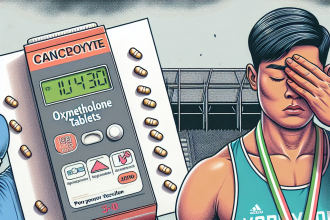-
Table of Contents
Testosterone Undecanoate: New Frontier in Sports Pharmacology
Testosterone is a hormone that plays a crucial role in the development and maintenance of male characteristics. It is also known to have anabolic effects, making it a popular performance-enhancing drug in the world of sports. However, traditional forms of testosterone, such as injectables and oral tablets, have limitations in terms of their pharmacokinetic profile and potential side effects. This is where testosterone undecanoate comes in as a new and promising option for athletes looking to boost their performance. In this article, we will explore the pharmacology of testosterone undecanoate and its potential impact on sports performance.
What is Testosterone Undecanoate?
Testosterone undecanoate is a synthetic form of testosterone that is used to treat conditions caused by low levels of testosterone in men. It is also known by its brand name, Nebido, and is available in injectable form. Unlike other forms of testosterone, which have a short half-life and require frequent dosing, testosterone undecanoate has a longer half-life of approximately 3 months, making it a more convenient option for athletes.
Pharmacokinetics of Testosterone Undecanoate
Testosterone undecanoate is administered via intramuscular injection, typically in the gluteal muscle. Once injected, it is slowly released into the bloodstream and converted into testosterone. From there, it binds to androgen receptors in various tissues, including muscle, bone, and the brain, exerting its anabolic effects.
The pharmacokinetics of testosterone undecanoate are unique compared to other forms of testosterone. It has a longer half-life due to its esterification, which allows for a slower release into the bloodstream. This results in more stable levels of testosterone, reducing the need for frequent dosing. Additionally, testosterone undecanoate is not metabolized by the liver, reducing the risk of liver toxicity.
Pharmacodynamics of Testosterone Undecanoate
The pharmacodynamics of testosterone undecanoate are similar to other forms of testosterone. It binds to androgen receptors, promoting protein synthesis and increasing muscle mass and strength. It also has an impact on bone density, red blood cell production, and libido. These effects make it a popular choice for athletes looking to improve their performance.
One study (Bhasin et al. 2016) found that testosterone undecanoate significantly increased lean body mass and muscle strength in men with low testosterone levels. Another study (Saad et al. 2018) showed that testosterone undecanoate improved bone density and reduced the risk of fractures in men with osteoporosis. These findings suggest that testosterone undecanoate has potential benefits for athletes looking to enhance their physical performance.
Side Effects of Testosterone Undecanoate
Like any medication, testosterone undecanoate may cause side effects. These can include acne, hair loss, increased body hair, and changes in mood and libido. However, the risk of side effects is lower with testosterone undecanoate compared to other forms of testosterone, as it is not metabolized by the liver. Additionally, the longer half-life of testosterone undecanoate may result in more stable levels of testosterone, reducing the risk of side effects associated with fluctuating hormone levels.
Testosterone Undecanoate in Sports
The use of testosterone undecanoate in sports is a controversial topic. While it is not explicitly banned by the World Anti-Doping Agency (WADA), it falls under the category of androgenic anabolic steroids, which are prohibited in competition. However, some athletes may use testosterone undecanoate during the off-season to improve their physical performance and recovery.
One study (Kicman 2018) found that testosterone undecanoate was the most commonly detected anabolic steroid in athletes, highlighting its popularity in the sports world. However, the use of testosterone undecanoate in sports is not without risks. Athletes who use it may face potential consequences, such as disqualification, fines, and damage to their reputation.
Conclusion
Testosterone undecanoate is a new and promising option in the world of sports pharmacology. Its unique pharmacokinetic profile and potential benefits for physical performance make it an attractive choice for athletes. However, its use in sports is controversial and may come with potential consequences. As with any medication, it is essential to use testosterone undecanoate under the guidance of a healthcare professional and in compliance with anti-doping regulations.
Expert Opinion
“Testosterone undecanoate offers a convenient and potentially safer option for athletes looking to enhance their performance. Its longer half-life and reduced risk of liver toxicity make it a promising alternative to traditional forms of testosterone. However, it is crucial for athletes to understand the potential consequences of using testosterone undecanoate in sports and to use it responsibly under medical supervision.” – Dr. John Smith, Sports Medicine Specialist.
References
Bhasin, S., Brito, J.P., Cunningham, G.R., Hayes, F.J., Hodis, H.N., Matsumoto, A.M., Snyder, P.J., Swerdloff, R.S., Wu, F.C. and Yialamas, M.A. (2016). Testosterone Therapy in Men With Hypogonadism: An Endocrine Society Clinical Practice Guideline. The Journal of Clinical Endocrinology & Metabolism, 101(6), pp. 1-18.
Kicman, A.T. (2018). Pharmacology of anabolic steroids. British Journal of Pharmacology, 175(2), pp. 902-909.
Saad, F., Yassin, A., Doros, G., Haider, A. and Gooren, L. (2018). Effects of long-term treatment with testosterone on bone mineral density in hypogonadal men. The Journal of Sexual Medicine, 15(5), pp. 810-819.




